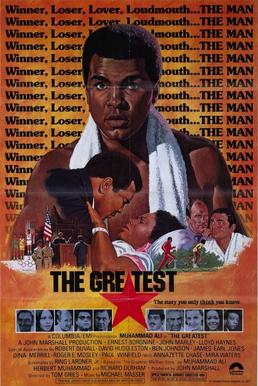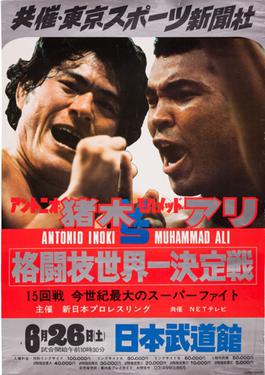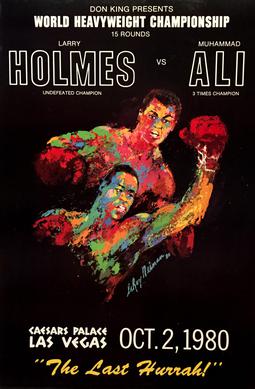Related Research Articles

Muhammad Ali was an American professional boxer and activist. Nicknamed "the Greatest", he is regarded as one of the most significant sports figures of the 20th century and is often regarded as the greatest heavyweight boxer of all time. He held the Ring magazine heavyweight title from 1964 to 1970. He was the undisputed champion from 1974 to 1978 and the WBA and Ring heavyweight champion from 1978 to 1979. In 1999, he was named Sportsman of the Century by Sports Illustrated and the Sports Personality of the Century by the BBC.

Ali is a 2001 American biographical sports drama film co-written, produced and directed by Michael Mann. The film focuses on ten years in the life of the boxer Muhammad Ali, played by Will Smith, from 1964 to 1974, featuring his capture of the heavyweight title from Sonny Liston, his conversion to Islam, criticism of the Vietnam War, and banishment from boxing, his return to fight Joe Frazier in 1971, and, finally, his reclaiming the title from George Foreman in the Rumble in the Jungle fight of 1974. It also touches on the great social and political upheaval in the United States following the assassinations of Malcolm X and Martin Luther King Jr.

Earnie Dee Shaver, best known as Earnie Shavers, was an American professional boxer who competed between 1969 and 1995. A two-time world heavyweight championship challenger, he is known as one of the hardest punchers in heavyweight boxing history. He scored 70 knockout wins, including 23 in the first round, for a 76.7% overall knockout rate.

Angelo Dundee was an American boxing trainer and cornerman. Internationally known for his work with Muhammad Ali (1960–1981), he also worked with 15 other world boxing champions, including Sugar Ray Leonard, Sean Mannion, José Nápoles, George Foreman, George Scott, Jimmy Ellis, Carmen Basilio, Luis Manuel Rodríguez, and Willie Pastrano.

James Albert Ellis was an American professional boxer. He won the vacant WBA heavyweight title in 1968 by defeating Jerry Quarry, making one successful title defense in the same year against Floyd Patterson, before losing to Joe Frazier in 1970.
The rope-a-dope is a boxing fighting technique in which one contender leans against the ropes of the boxing ring and draws non-injuring offensive punches, letting the opponent tire himself out. This gives the former the opportunity then to execute devastating offensive punches to help them win. The rope-a-dope is most famously associated with Muhammad Ali in his October 1974 Rumble in the Jungle match against world heavyweight champion George Foreman in Kinshasa, Zaire,.

The Greatest is a 1977 biographical sports film about the life of boxer Muhammad Ali, in which Ali plays himself. It was directed by Tom Gries. The film follows Ali's life from the 1960 Summer Olympics to his regaining the heavyweight crown from George Foreman in their famous "Rumble in the Jungle" fight in 1974. The film consists largely of archival footage of Ali's boxing matches used in the screenplay.
Fernando Pacheco Jimenez known publicly as Ferdie Pacheco, was the personal physician and cornerman for world heavyweight boxing champion Muhammad Ali as well as numerous other boxing champions. He was also a long-time boxing television commentator.

Muhammad Ali: His Life and Times is a biography of the boxer Muhammad Ali, written in 1991 by Thomas Hauser. It won the William Hill Sports Book of the Year award in that year.
Jim Robinson, known as "Sweet Jimmy", was an American boxer from Miami. Robinson fought Muhammad Ali in Miami Beach on February 7, 1961 as a last-minute replacement for Willie Gullatt. Robinson became Ali's fourth professional opponent. His whereabouts and status are currently unknown.

Muhammad Ali vs. Antonio Inoki, billed as The War of the Worlds, was a fight between American professional boxer Muhammad Ali and Japanese professional wrestler Antonio Inoki, held at the Nippon Budokan arena in Tokyo, Japan, on June 26, 1976. At the time, Ali had come off a knockout victory over Richard Dunn in May and was the undisputed heavyweight boxing champion. Inoki, who had been taught catch wrestling by wrestler Karl Gotch, was staging exhibition fights against champions of various martial arts, in an attempt to show that pro wrestling was the dominant fighting discipline.
Lou Esa is an American former professional heavyweight boxer from Wayne, New Jersey, who had 26 fights with 16 knockouts in 19 wins.
Ali: An American Hero is an American television film which aired on August 31, 2000 on FOX. It chronicles portions of the career of heavyweight boxer Muhammad Ali, who is portrayed by David Ramsey.

The Greatest: My Own Story is a 1975 autobiography of heavyweight boxer Muhammad Ali, who was three times World Heavyweight Champion and has been called the greatest heavyweight from all eras.

Larry Holmes vs. Muhammad Ali, billed as "The Last Hurrah!", was a professional boxing bout contested on October 2, 1980, in Las Vegas for the WBC and vacant The Ring heavyweight championships.
Muhammad Ali vs. Leon Spinks was a professional boxing match contested on February 15, 1978, in Las Vegas, Nevada, for the WBA, WBC, and The Ring heavyweight championship.
Muhammad Ali and Henry Cooper fought two boxing matches with each other in London. Their first match took place on 18 June 1963 and the second on 21 May 1966. Ali won both matches. The first fight was stopped by the referee in the fifth round, and the second in the sixth round. Both fights were stopped after Cooper started bleeding excessively from a cut to the left eye. The first Ali-Cooper bout is remembered for being one of the four fights in which Ali was officially knocked down in the ring by his boxing opponent, as well as leading to the mandate that ringside handlers always have an extra pair of boxing gloves available.
Heavyweight boxers Muhammad Ali and Oscar Bonavena fought at Madison Square Garden in New York City on December 7, 1970. Ali won the bout, his first at the current Madison Square Garden, through a technical knockout in the 15th round.
Cassius Clay fought Sonny Banks in a ten-round boxing match at Madison Square Garden in New York City on February 10, 1962. Clay won the fight through a technical knockout when the referee stopped the fight in the fourth round. The event is remembered for being the first professional boxing match in which Ali was officially knocked down in the ring by his boxing opponent.

Muhammad Ali is widely regarded by many boxing commentators and historians as the greatest heavyweight boxer of all time. Boxing magazine The Ring named him number 1 in a 1998 ranking of greatest heavyweights from all eras. In 1999, The Associated Press voted Ali the number one heavyweight of the 20th century. In 1999, Ali was named the second greatest boxer in history, pound for pound, by ESPN; behind only welterweight and middleweight legend Sugar Ray Robinson. In December 2007, ESPN listed Ali second in its choice of the greatest heavyweights of all time, behind Joe Louis. He was inducted into the International Boxing Hall of Fame in the inaugural class of 1990.
References
- 1 2 3 Ferdie Pacheco (1992). Muhammad Ali: A View from the Corner. Birch Lane Press. pp. 188–9.
- 1 2 3 Encinosa, Enrique (August 2004). "The Life and Times of Luis Sarria" . Retrieved 25 December 2016.
- 1 2 3 "Ali And His Entourage: Life after the end of the greatest show on earth". Sports Illustrated. 10 October 2014. Retrieved 25 December 2016.
- ↑ "Muhammad Ali, The Champ: previously unseen photographs" . Retrieved 25 December 2016.
- ↑ "Luis Sarria" . Retrieved 25 December 2016.
- ↑ Ferdie Pacheco (1992). Muhammad Ali: A View from the Corner. Birch Lane Press. p. 188.